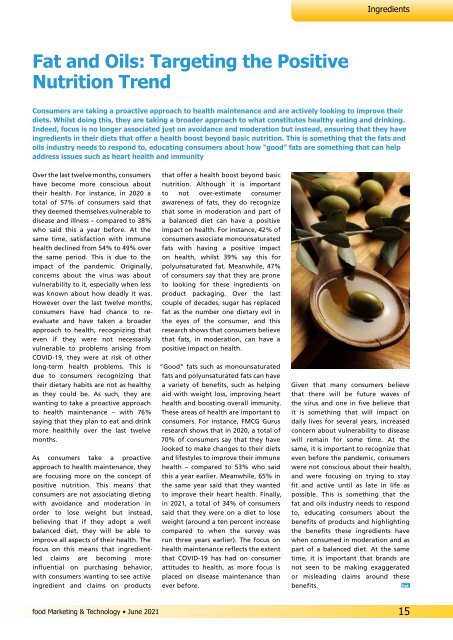food Marketing & Technology 3/2021
Create successful ePaper yourself
Turn your PDF publications into a flip-book with our unique Google optimized e-Paper software.
Ingredients<br />
Fat and Oils: Targeting the Positive<br />
Nutrition Trend<br />
Consumers are taking a proactive approach to health maintenance and are actively looking to improve their<br />
diets. Whilst doing this, they are taking a broader approach to what constitutes healthy eating and drinking.<br />
Indeed, focus is no longer associated just on avoidance and moderation but instead, ensuring that they have<br />
ingredients in their diets that offer a health boost beyond basic nutrition. This is something that the fats and<br />
oils industry needs to respond to, educating consumers about how “good” fats are something that can help<br />
address issues such as heart health and immunity<br />
Over the last twelve months, consumers<br />
have become more conscious about<br />
their health. For instance, in 2020 a<br />
total of 57% of consumers said that<br />
they deemed themselves vulnerable to<br />
disease and illness – compared to 38%<br />
who said this a year before. At the<br />
same time, satisfaction with immune<br />
health declined from 54% to 49% over<br />
the same period. This is due to the<br />
impact of the pandemic. Originally,<br />
concerns about the virus was about<br />
vulnerability to it, especially when less<br />
was known about how deadly it was.<br />
However over the last twelve months,<br />
consumers have had chance to reevaluate<br />
and have taken a broader<br />
approach to health, recognizing that<br />
even if they were not necessarily<br />
vulnerable to problems arising from<br />
COVID-19, they were at risk of other<br />
long-term health problems. This is<br />
due to consumers recognizing that<br />
their dietary habits are not as healthy<br />
as they could be. As such, they are<br />
wanting to take a proactive approach<br />
to health maintenance – with 76%<br />
saying that they plan to eat and drink<br />
more healthily over the last twelve<br />
months.<br />
As consumers take a proactive<br />
approach to health maintenance, they<br />
are focusing more on the concept of<br />
positive nutrition. This means that<br />
consumers are not associating dieting<br />
with avoidance and moderation in<br />
order to lose weight but instead,<br />
believing that if they adopt a well<br />
balanced diet, they will be able to<br />
improve all aspects of their health. The<br />
focus on this means that ingredientled<br />
claims are becoming more<br />
influential on purchasing behavior,<br />
with consumers wanting to see active<br />
ingredient and claims on products<br />
that offer a health boost beyond basic<br />
nutrition. Although it is important<br />
to not over-estimate consumer<br />
awareness of fats, they do recognize<br />
that some in moderation and part of<br />
a balanced diet can have a positive<br />
impact on health. For instance, 42% of<br />
consumers associate monounsaturated<br />
fats with having a positive impact<br />
on health, whilst 39% say this for<br />
polyunsaturated fat. Meanwhile, 47%<br />
of consumers say that they are prone<br />
to looking for these ingredients on<br />
product packaging. Over the last<br />
couple of decades, sugar has replaced<br />
fat as the number one dietary evil in<br />
the eyes of the consumer, and this<br />
research shows that consumers believe<br />
that fats, in moderation, can have a<br />
positive impact on health.<br />
“Good” fats such as monounsaturated<br />
fats and polyunsaturated fats can have<br />
a variety of benefits, such as helping<br />
aid with weight loss, improving heart<br />
health and boosting overall immunity.<br />
These areas of health are important to<br />
consumers. For instance, FMCG Gurus<br />
research shows that in 2020, a total of<br />
70% of consumers say that they have<br />
looked to make changes to their diets<br />
and lifestyles to improve their immune<br />
health – compared to 53% who said<br />
this a year earlier. Meanwhile, 65% in<br />
the same year said that they wanted<br />
to improve their heart health. Finally,<br />
in <strong>2021</strong>, a total of 34% of consumers<br />
said that they were on a diet to lose<br />
weight (around a ten percent increase<br />
compared to when the survey was<br />
run three years earlier). The focus on<br />
health maintenance reflects the extent<br />
that COVID-19 has had on consumer<br />
attitudes to health, as more focus is<br />
placed on disease maintenance than<br />
ever before.<br />
Given that many consumers believe<br />
that there will be future waves of<br />
the virus and one in five believe that<br />
it is something that will impact on<br />
daily lives for several years, increased<br />
concern about vulnerability to disease<br />
will remain for some time. At the<br />
same, it is important to recognize that<br />
even before the pandemic, consumers<br />
were not conscious about their health,<br />
and were focusing on trying to stay<br />
fit and active until as late in life as<br />
possible. This is something that the<br />
fat and oils industry needs to respond<br />
to, educating consumers about the<br />
benefits of products and highlighting<br />
the benefits these ingredients have<br />
when consumed in moderation and as<br />
part of a balanced diet. At the same<br />
time, it is important that brands are<br />
not seen to be making exaggerated<br />
or misleading claims around these<br />
benefits.<br />
fmt<br />
<strong>food</strong> <strong>Marketing</strong> & <strong>Technology</strong> • June <strong>2021</strong><br />
15


















